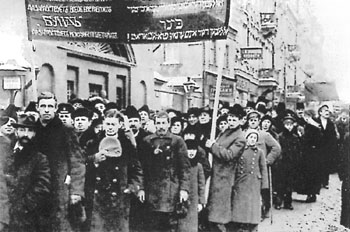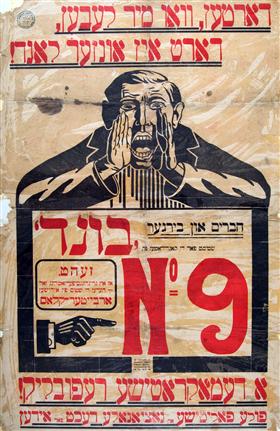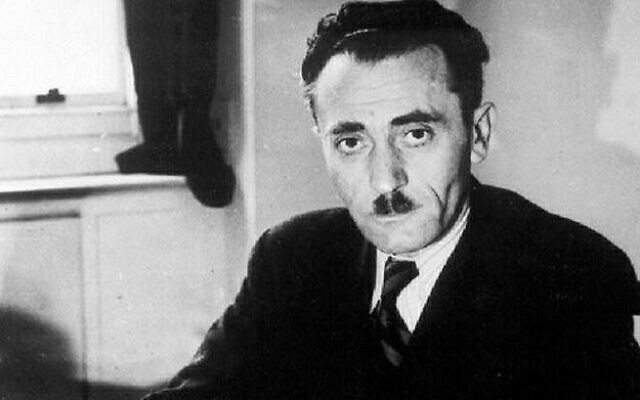Millions of Bund pages to be digitised for posterity
YIVO Institute for Jewish Research will make publicly available papers of Jewish labour movement founded in Lithuania, including speeches delivered by anarchists and revolutionaries
Jenni Frazer is a freelance journalist
Nearly 80 years ago, in May 1943, a despairing Polish Jewish politician, Shmuel Zygielbojm, was found dead from suicide in a flat in London’s Porchester Square.
His tragic end features in an eight-year project launched by the New York-based YIVO Institute for Jewish Research to digitise all the papers of the Bund, the late 19th- and 20th-century Jewish labour movement, which flourished first in Russia and then Europe and America.
The digitisation scheme of 3.5 million pages is intended to make the work of the Jewish socialists and trade unionists — and the occasional revolutionary — available online to a global audience.

The Bund movement has its origins in the Russian empire. It was a movement of the working classes, preaching revolution, while at the same time running sports organisations, summer camps and sanatoriums, all for the benefit of activist Jews and their families.
Founded in 1897 in Vilnius, now in Lithuania, the Bund teachings energised whole cohorts of angry Jewish young men and women, desperate to break out of their lives of poverty. Soon the Bundists and their campaigns spread throughout Eastern Europe, and then to Britain and America, as the Jews began to emigrate, seeking not just economic improvement, but also radical social change.
The Bund papers, covering the years 1870 to 1992, include correspondence of major Jewish political and labour leaders; documentation about revolutionary cells active in Europe from the late 1800s right up to the Second World War; ledger books detailing the activities of youth groups; manuscripts of speeches delivered by anarchists and revolutionaries and other Yiddish cultural figures and posters advertising rallies and marches.
The story of what drove Zygielbojm to suicide can be found in the Bund archives.

In April 1942, he went to London to serve as the Bund’s representative in the Polish National Council, an advisory body to the Polish government in exile.
But his pleas, on behalf of the remnants of Polish Jewry, to the British political elite and the Polish government, fell on deaf ears. After learning of the Warsaw Ghetto uprising and the ghetto’s destruction in April 1943, he understood that his efforts had been futile. He had managed to address a meeting of the British Labour Party and broadcast on the BBC, but to no avail. Even a long report in the Daily Telegraph about the fate of the Jews of Europe, which referred to the existence of Nazi gas chambers, based on Zygielbojm’s research, did not change the minds of the British or the Poles.
His booklet, written in English in 1942, entitled Stop Them Now. German Mass Murder of Jews in Poland, with a foreword by Lord Wedgwood, was his final attempt to make the world aware of the extermination of Jews in Europe.
By May 1943, aged 48, Zygielbojm was tired and angry. And he decided on an action that he hoped would focus attention on the fact that the Jews had been abandoned by the Allied powers and shock them into saving what remained of Polish Jewry: on 12 May, 1943, he killed himself.
In his final letters, addressed to the heads of the Polish government in exile, he denounced the free world for allowing “the greatest crime in the history of mankind” to be carried out and wrote of his hope that “the Polish government [would] embark immediately on diplomatic action… in order to save the living remnant of the Polish Jews from destruction”.
In 1996, Westminster City Council put a plaque on the building where he died.

Thank you for helping to make Jewish News the leading source of news and opinion for the UK Jewish community. Today we're asking for your invaluable help to continue putting our community first in everything we do.
For as little as £5 a month you can help sustain the vital work we do in celebrating and standing up for Jewish life in Britain.
Jewish News holds our community together and keeps us connected. Like a synagogue, it’s where people turn to feel part of something bigger. It also proudly shows the rest of Britain the vibrancy and rich culture of modern Jewish life.
You can make a quick and easy one-off or monthly contribution of £5, £10, £20 or any other sum you’re comfortable with.
100% of your donation will help us continue celebrating our community, in all its dynamic diversity...
Engaging
Being a community platform means so much more than producing a newspaper and website. One of our proudest roles is media partnering with our invaluable charities to amplify the outstanding work they do to help us all.
Celebrating
There’s no shortage of oys in the world but Jewish News takes every opportunity to celebrate the joys too, through projects like Night of Heroes, 40 Under 40 and other compelling countdowns that make the community kvell with pride.
Pioneering
In the first collaboration between media outlets from different faiths, Jewish News worked with British Muslim TV and Church Times to produce a list of young activists leading the way on interfaith understanding.
Campaigning
Royal Mail issued a stamp honouring Holocaust hero Sir Nicholas Winton after a Jewish News campaign attracted more than 100,000 backers. Jewish Newsalso produces special editions of the paper highlighting pressing issues including mental health and Holocaust remembrance.
Easy access
In an age when news is readily accessible, Jewish News provides high-quality content free online and offline, removing any financial barriers to connecting people.
Voice of our community to wider society
The Jewish News team regularly appears on TV, radio and on the pages of the national press to comment on stories about the Jewish community. Easy access to the paper on the streets of London also means Jewish News provides an invaluable window into the community for the country at large.
We hope you agree all this is worth preserving.






















